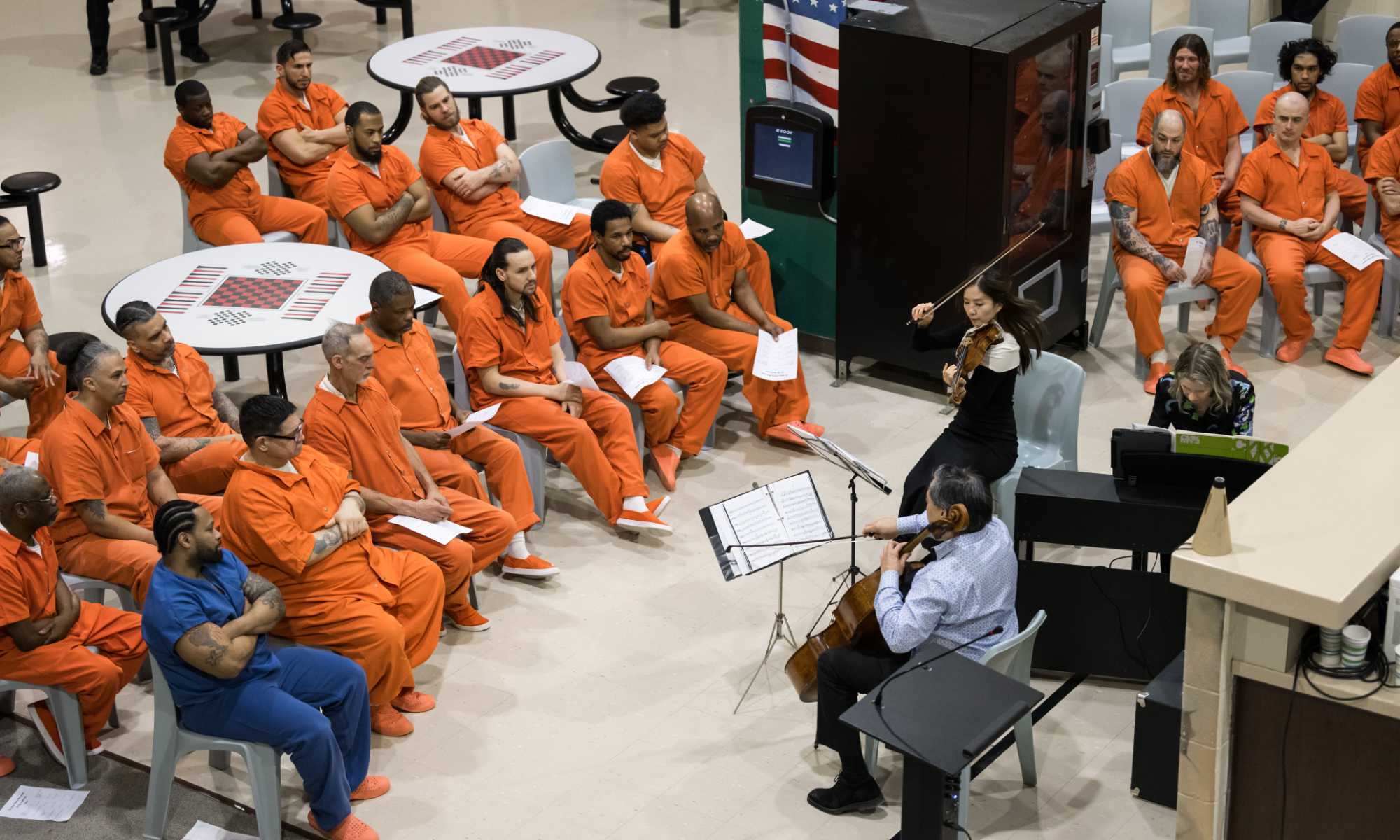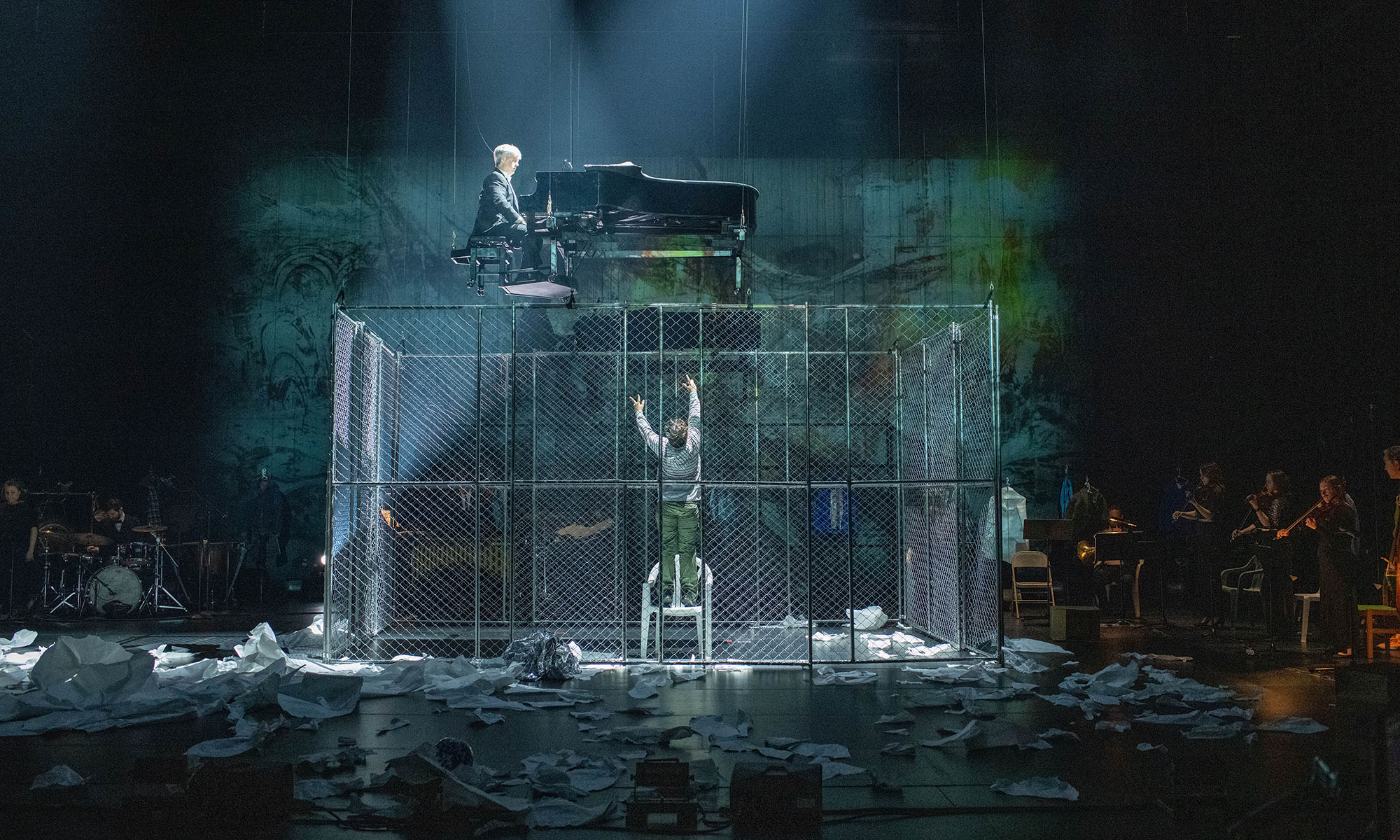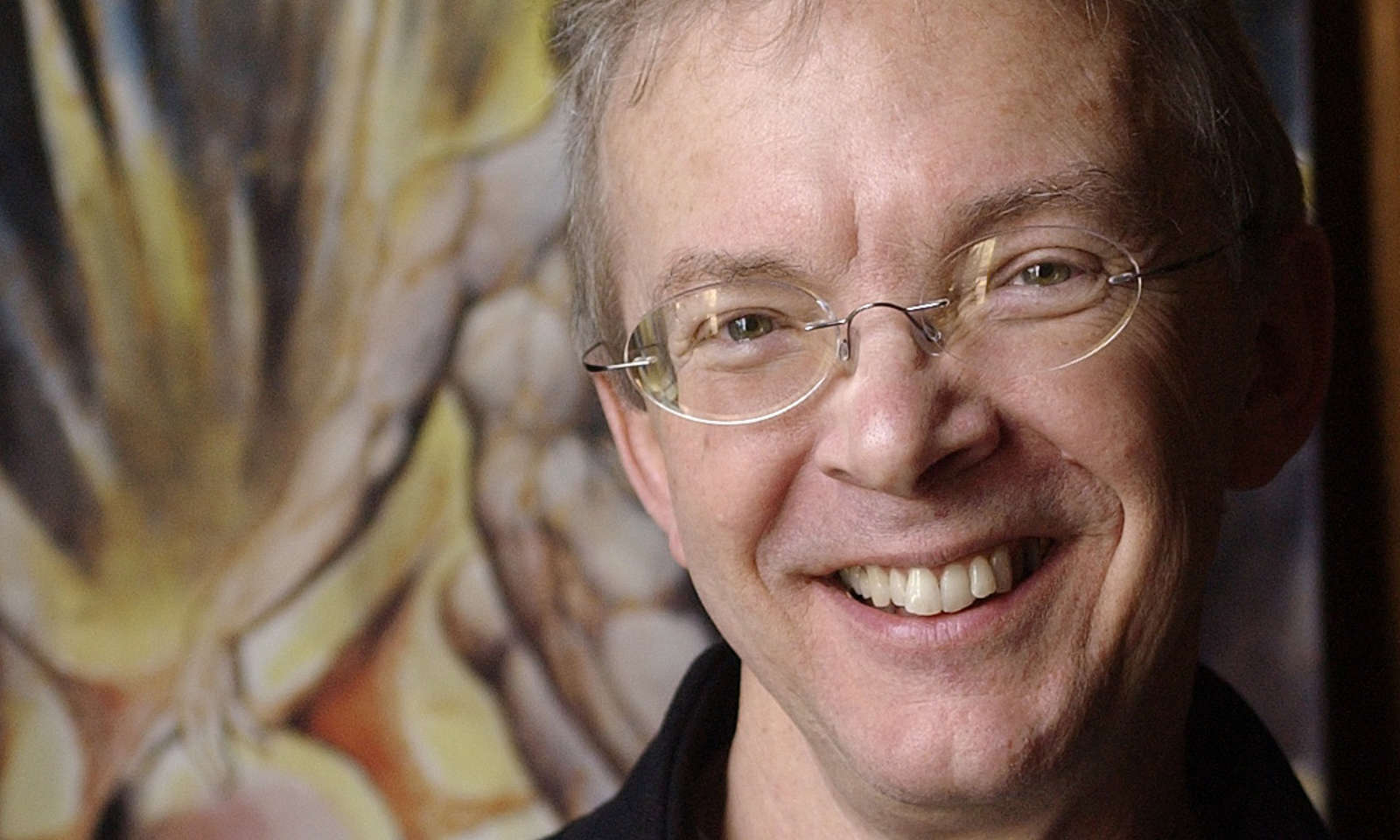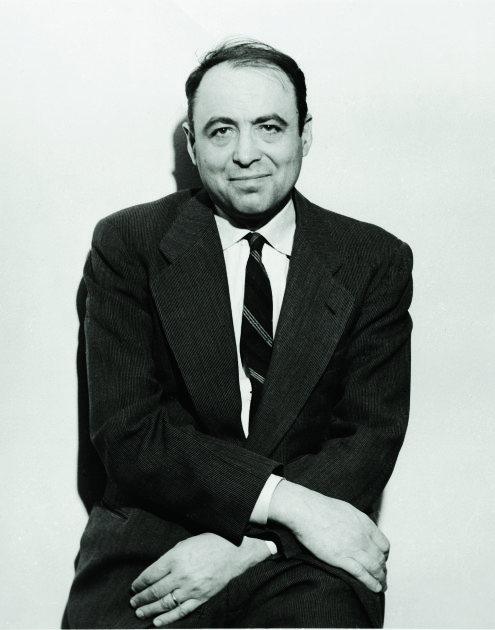
By Edward Moran
Seventy-five years after it was written by a twenty-something college graduate—and long before that graduate became a Rochester professor—Hyam Plutzik’s eloquent Letter from a Young Poet still resonates with today’s millennials in their quest for life’s calling. Addressed to Odell Shepard, Plutzik’s mentor at Trinity College, the 72-page letter is a “song of the self and the soul,” in the words of poet Daniel Halpern, who wrote the Foreword to the book, published in 2015 by Trinity’s Watkinson Library.
With its title inspired by Rainer Maria Rilke’s acclaimed Letters to a Young Poet, Letter from a Young Poet can be read as Plutzik’s response to Rilke’s mentorial admonition to his young poet friend to “have patience with everything that remains unsolved in your hear . . . live in the question.”
Plutzik would continue to ask ever deeper questions for the rest of his life. Early in his career at the University, Plutzik committed himself wholeheartedly to following his poetic muse. In a 1950 article for the Poetry Society of Rochester, speaking on behalf of poets everywhere, he wrote: “We must stay alive, must write then, write as excellently as we can. And if out of our labors and agonies there appears, along with our more moderate triumphs, even one speck of the final distillate, the eternal stuff pure and radiant as a drop of uranium, we are justified.”
But mortal poets, unlike Athena, do not spring full-blown from the brows of the gods. Typically, a poet’s “final distillate” is the result of a lifetime of engagement with the radioactive element known as language. “Nobody ever said a poet’s life is supposed to be easy,” declared the late Hayden Carruth in the 2006 documentary film Hyam Plutzik: American Poet. “It’s not—poets are supposed to do hard work.”
This letter foreshadows Plutzik’s eminent career as a poet and as the Deane Professor of Poetry and Rhetoric at the University from 1945 until his untimely death in 1962, at age 50. During his 17-year tenure here, he became a finalist for the Pulitzer Prize three times, for Aspects of Proteus (1949), Apples from Shinar (1959), and Horatio (1962). Following his death, the Plutzik Reading Series was established in his honor, bringing many of the world’s leading poets and authors to the campus at no charge to audiences.
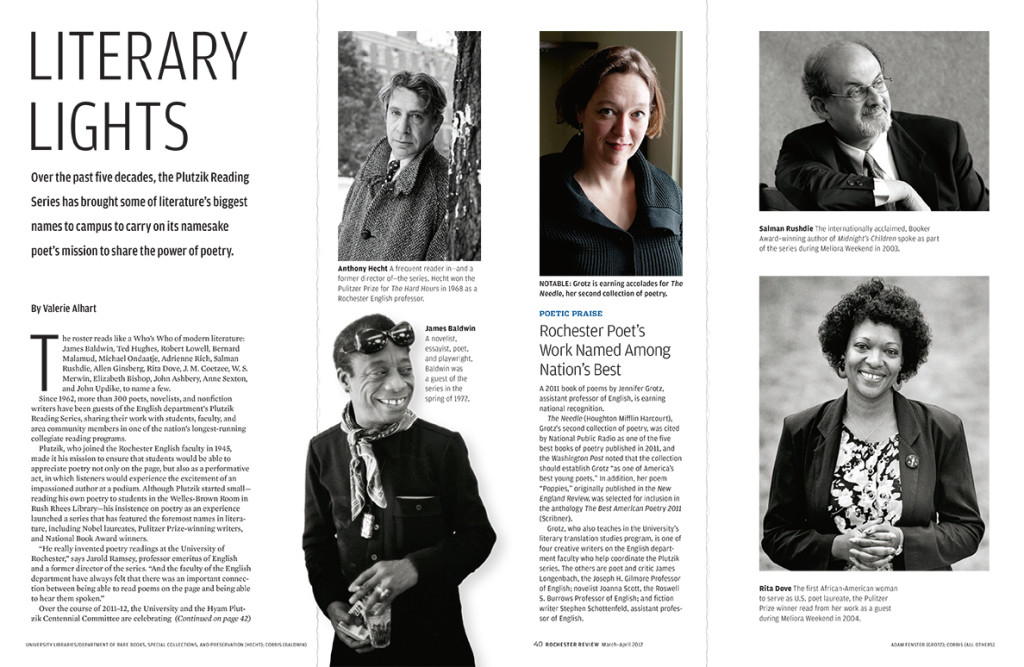
Reflecting on the illustrious history of the series, now in its 54th year, former series director Jarold Ramsey wrote: “At bottom, we have shared the conviction, inherited from Hyam Plutzik himself, that contemporary poetry and fiction matter greatly, most especially in intellectual communities like Rochester, and that local visits by active writers are worth the having.”
In the excerpt that follows, we read of the young Plutzik’s adventures as a cub reporter for the Brooklyn Eagle. Like many 20-somethings fresh out of college, he confronted the “terrible weight of the big city” with an admixture of trepidation and anticipation, pondering where his destiny lay while working hard in such a daunting environment.
Edward Moran is a writer and literary historian who has done extensive research in the Hyam Plutzik Archive at Rush Rhees Library over the past 10 years. He is literary advisor to the Hyam Plutzik Poetry Project and served as literary advisor to the documentary film Hyam Plutzik: American Poet, which premiered at the University in 2006.
‘I’m Going to Throw You Out and Make You Swim’
By Hyam Plutzik
The school year came to an end, and I left Yale as meek as a whipped dog. The trouble, I suppose, was that I had done things half-heartedly. If I hated graduate work and thought it a waste of time, I should have had the courage to break away cleanly; on the other hand, since I had decided to hang on, I should have decided to do well what I was supposed to do. What actually happened was that I changed back and forth without decision from my school work to the other literary interests, and ended up confused and desperate.
This was the summer of 1934. I went down to New York, where my folks had moved, and I resolved that the first thing I should do would be to get a job and support myself. I needed that as a prerequisite to my self-respect.
But jobs in those days were few. An air of stringency seemed to hang about New York, and people talked and talked, and felt that their foothold in our system had slipped, and hardness and cynicism were to be met everywhere. There is nothing so devastating as to feel that one has no place in the commonwealth in which one lives; that one is superfluous. That summer was, I think, the unhappiest time of my life. I am sure that in my old age, if ever I should become fearful of change and indifferent to the struggles and idealisms of the young, a turning of my memory to the experiences of that summer will surely bring tolerance. I have had other intervals of unemployment since then, but for the latter I was already armored. The first experience, however, was like the sun beating down on a lidless eye.
Adding to my confusion was the terrible weight of the big city itself. I had lived all my life (except the first few years) in Connecticut—first in a country town and then in a city which, while of industrial nature, nevertheless lay among wooded hills and farms. In the metropolis I could not help remembering that miles of houses stretched in every direction. For thirty miles or more the city or its suburbs stretched out, and in this area all trees were domesticated trees, and all grass was domesticated grass, and flowers were caged in window-pots or two-by-four gardens. If you started to walk you passed houses, and shops, and more houses, and more shops. Fields, if you came to them at all, were usually littered, or overgrown with dirty weeds. Nowhere was the naked earth to be seen in its purity. Instead of the smell of plowed earth, there was, wherever digging occurred, the rancid odor of gas. And everywhere, of course, there were people. I love my fellow men to be sure—as individuals. But humanity en masse is a monstrous thing, particularly if it is pressed together so tightly that the individuals in it lose their human dignity. And to a poet such humanity is absolutely devastating. I don’t know about the habits of other poets, but when I am walking along thinking over my thoughts I like to talk to myself—as, come to think of it, Wordsworth did. In New York it is utterly impossible to talk to oneself—with dignity. One walks along a seemingly deserted avenue some evening, thinking one is alone and can, if one wishes, utter any noble words that come to the mind: one’s own or others’. And suddenly out of nowhere, numerous people are around one, and they look at one queerly, and hurry by for fear that this strange mutterer to himself may become violent.
In brief, the city just doesn’t allow one to think.
About three months—and they seemed like an eon—went by. I stood at last in an editor’s office, and rattled off into his distracted ear the laudatory spiel about myself that I had prepared beforehand. He listened impatiently, and then, with the pomposity of which only newspaper editors are capable, he picked up a copy of the publication which he headed. It was the Brooklyn Daily Eagle, once an important molder of American opinion but lately fallen on parlous days. “You see this,” he said, pointing to a column of oddities and small human interest items. “Go out and get me something like this. Let’s see what you can do.”
I rushed out of that place like a bat out of hell. At last, after all the indecision, I had a purpose in life: to write a column like the one he showed me. I rushed around feverishly. I pestered all my friends to tell me of any queer people they knew; or of any interesting anecdotes. I interviewed a shoeshine man and learned all about the changing methods of shining shoes in the last thirty years. Despite my natural timidity I remember passing all sorts of no trespassing signs to get down to the waterfront below Riverside Drive, where I had seen a strange sailing vessel moored. By ignoring a VICIOUS DOG I managed to reach the Captain, a picturesque Norwegian who told me about shipwreck and sea-serpent, St. Elmo’s fire and whales. I also interviewed a Chinese herb-doctor, I remember. All in all, I had a perfectly wonderful time, and I began to have great love and admiration for my fellow men, whom, up to that moment, I had hardly met.
I returned to the editor with my material. He was a tall gray efficient looking personage, who took one look at the material and shunted me off to an assistant. The latter read the stuff over, told me it was good, and said: “Go out and get me some more stuff like this.” I was a bit taken aback at that, for I had figured that I had combed the city clean in my search. But under the drive of necessity I went out and got another batch of stories. The editor was impressed. “And now” he said, nodding to me very confidentially, “I am going to give you a break—a break such as we never give to a beginner like yourself.” He paused and my heart started pounding with annoying vehemence. He hauled out a clipping. “You see this,” he said. And he went on to tell me a story about a certain old spinster, a Louise Herle, who had recently died in squalid surroundings in South Brooklyn, but who had actually been very rich, with scads of money stuck under the carpet and behind the clapboards of the house, and with a sizeable fortune in the bank. My job, I learned, was to find out what had made her act that way. “There is a story,” the editor said, with the romantic archaism to which editors sometimes resort, “that at some time or other she plighted her troth with some guy, but he left her cold, and that’s why she lived this way. It’s up to you to find out what happened. If she had a love affair, let’s hear about it. Here,” he added, “is the name of her cousin in Jamaica, her only relative apparently. Go to it.”
I rushed out of that place with a song on my lips. In Jamaica I pressed the doorbell of the cousin’s house, and was immediately confronted by the cousin’s wife. “I am from the Brooklyn Daily Eagle,” I began. “I should like to –”
“Not a thing,” she said, and she went on to say what she thought of reporters in general, and of our rudeness, and how we had tormented her, and misquoted her.
“But—” I said.
She shut the door.
I decided, after shivering for a few moments on the sidewalk, that the best thing to do was to try to get her husband in his office—he being a lawyer. He was out, and while whiling away the time till his return I wandered across the street into an old Dutch graveyard and moodily inspected the tombstones. I remember it all so distinctly. There was one gravestone that struck a chord in me, and I copied down its epitaph:
Here………….
Peter………….
Of N………….
Jan……………
So sev………..
O cruel……….
Almost in every line the stone had crumbled away just at the point where some definite information about the dead man would be given. God and the elements had conspired to leave him nameless and unidentified. In a later period, when thoughts about death and its nature predominated in my mind, I remember thinking how this namelessness attached to all the dwellers in the great cosmopolis, even the living. And so I wrote:
Living and dead, both are anonymous;
And pass with turned-up cloak that hides the face
Through dark and the rapacious wind of time.
It was not a period of laughter when I wrote that.
Well, the cousin returned to his office at last. When he learned about me: “What,” he thundered, “is the idea of scaring my wife to death! She just called me up, and you’ve got a hell of a nerve to, etc., etc.” This gentleman, whose name is Ashmead, has since become one of the big Republican bosses in New York City, and I suppose he cows his underlings by yelling at them in the same way as he did at me.
I repressed the desire to flee and managed to put in my questions. Had the old lady had any love affairs? I asked. He poo-pooed the idea and swore before heaven that her only interest in life had been vouchers, IOU’s and rents. I ultimately proved him wrong and in doing so I had a perfectly wonderful time. For a month I haunted South Brooklyn, the scene of the old lady’s demise. I interviewed all her acquaintances, friends, and enemies. I learned all her idiosyncracies: that she wore three pair of underwear at one time, and other such entrancing matters. Using a local candy store as my GHQ, I posted over the neighborhood, interviewing the merchants, the policeman who had found her body, the hangers-on, the boys with lollipops in their mouths. The more I did this the more I loved my fellow-men, and the world of the PMLA receded from me, and I felt myself becoming a free man. Was not this retired saloon-keeper more interesting to me than the researches on the Ur-Hamlet? Was not this old German cigar-maker, with his gentility, better for the soul than 50 papers on Swinburne? . . .
I was enjoying myself immensely, but I still had found nothing to indicate a blighted love affair. The break in the case (as they say in detective stories) came through the intermediation of some cookies. These cookies were being baked by a friend of the old lady’s whom I was interviewing. She was very uncommunicative, but was civil enough to offer the young reporter a cookie. The cookie was delicious and the young reporter, without guile, praised their savor. That touched the Achilles heel. The woman broke down and in no time at all I had the information I sought: It was a tale of blighted love. There had been a fellow called Henry, and a misunderstanding, and a sad old age.
Armed with the information about the phantom lover Henry, I rushed back to the paper, and was pleased to find the feature editor pleasantly surprised at the amplitude of my data. He looked at me benevolently. “Before you begin writing,” he said, “I want to warn you of something. None of your fancy college writing here. No long words. No complicated sentences. No parenthetical phrases. Do you understand?”
I nodded humbly, and proceeded to write the story in what amounted to words of one syllable. My vocabulary must have approached Basic English. When I was done, the editor gave the stuff to the paper’s star reporter, who rewrote it all, using numerous long words, complicated sentences and parenthetical phrases. Thus I learned about newspaper work and its little pretences.
At that time the editor-in-chief of the Brooklyn Eagle was Cleveland Rodgers, a distinguished-looking man with a gray mop of hair. Walt Whitman, as you may remember, had been editor of this same paper about 100 years before; Mr. Rodgers was greatly interested in him. I had, in the course of one of my papers at Yale, made use of the two volumes (“Gathering of Forces”) of Whitman’s writings on the Eagle by Rodgers and a collaborator, so I had a method of ingress into the sanctum of the editor himself. However, for some reason which is at present unfathomable to me but which was connected with pride or something, I was reluctant to use this lever of common interest to pry myself into the Editor’s attention. I therefore spent my time now waiting at the gate of the palace, as it were, waiting for the job that the feature editor had promised me on the basis of my three articles on the old lady. The feature editor was very insistent that he would give me the job. Despite his wry remarks about my college training, I think he was a little afraid of me. He had asked me, after I had picked up the first issue of the paper in which my story appeared and found that it had been rewritten, whether I was hurt at the incident. I told him no, but as a matter of fact I was deeply offended, as I must have revealed in my manner. My offense increased when in the later editions of the paper my name was abstracted and that of the rewrite man substituted.
One day, after some weeks of writing petty feature stories and waiting for the promised job, I drummed up enough courage to wander into Mr. Rodgers’ office to engage him in discussion on Walt Whitman. He naturally asked me who I was and what I was doing there, and when he learned that there was a young scholar on his doorstep he was greatly amused. So he hired me as his secretary.
It was a marriage de sentiment rather than convenance. Of secretaries I was undoubtedly the world’s worst. . .
My employer had been frankly told when he hired me of my lack of secretarial training, but he had always been somewhat informal in his hiring of secretaries. . . .The next day he called me into his office and said, in a tone of self-conscious deprecation: “You,” he said, “are no secretary.”
I smelt some ill-tidings on the wind. “I didn’t make any pretence of being one when you hired me,” I said.
“You’re too good for this job,” he said. “With your training you’re wasting your time on this sort of work. You ought to be earning twice as much as we pay you. You’re getting lazy here, into a rut. I’m going to throw you out and make you swim.”
I nodded glumly and he went on to tell me that the trouble with me was that I was impatient with details and wanted to reach the stars at one swoop and without any intermediate stages of approach. The thing to do, he said, is to be satisfied to start low and then to work up degree by degree until the longed-for ambition is attained. At this, I tried to mumble something to the effect that perhaps this job from which he was firing me and which I was “too good” for might be one of the low stages which he was talking about, and that therefore his firing me was inconsistent. But somehow I couldn’t say a thing but mumble words of agreement with everything he said.
He continued with an assertion that I had ability but that I would never show it unless I were forced to do so. My being fired, he said, was the best thing in the world for me and in later years I would thank him for doing me this favor. My eye! Absurder words never rolled off tongue or pen.
Excerpted from Letter from a Young Poet by Hyam Plutzik with a foreword by Daniel Halpern, published by The Watkinson Library at Trinity College Copyright © 2015 Trinity College and the Estate of Hyam Plutzik. Used with permission.

